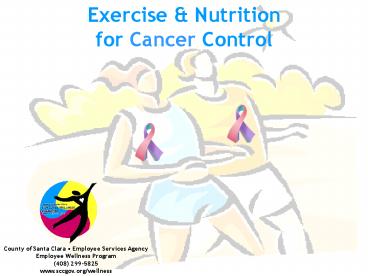Exercise PowerPoint PPT Presentation
1 / 8
Title: Exercise
1
Exercise Nutrition for Cancer Control
County of Santa Clara Employee Services
Agency Employee Wellness Program (408)
299-5825 www.sccgov.org/wellness
2
Vary Your Veggies
- Research shows that eating a variety of plant
foods can protect against a range of cancers,
including mouth, pharynx, larynx, esophagus,
stomach, lung, pancreas, and prostate. - Vegetables and fruits contain vitamins and
minerals, which helps keep the body healthy and
strengthens our immune system. - Foods containing fiber (such as whole-grain bread
and pasta, oats, vegetables, and fruits) helps to
speed up digestion and can decrease your risk of
developing colorectal cancer. - When preparing a meal, aim to fill at least
two-thirds of your plate with vegetables, fruits,
whole grains, and beans.
3
Reduce Red Meats
- Red meat (such as beef, pork, and lamb) contains
substances that are linked to colon cancer. - Limit Consumption of red meats to no more than 18
oz. cooked weight per week . - Avoid processed meats (ham, bacon, pastrami and
salami, as well as hot dogs and sausages). When
meat is preserved by smoking, curing or salting,
or by the addition of preservatives,
cancer-causing substances (carcinogens) can be
formed. - Research on processed meat shows cancer risk
starts to increase with any portion.
4
Avoid Alcohol Tobacco
- For cancer prevention, avoid drinking alcohol.
However, if you do drink alcohol, limit your
consumption to no more than 2 drinks a day for
men and 1 drink a day for women. - There is convincing evidence that alcohol
increases the risk of cancer of the mouth,
pharynx, larynx, esophagus and breast, liver, and
colorectal cancer. - Alcohol is particularly harmful when combined
with smoking. Not only does the use of tobacco
greatly increase your risk for lung cancer, but
it also appears to influence some other forms of
cancer, and significantly increases your risk for
cardiovascular disease and stroke.
5
Stop the Salt
- Too much salt can be harmful to our health,
increasing your risk of stomach cancer as well as
high blood pressure. - Our daily intake of salt should be less than
2,400 milligrams. - Most of the salt in our diet comes from processed
foods. - Watch out for breakfast cereals, bread, frozen
meals, pizza, chips, canned products, and
processed meats. - Even sweet foods like cookies can contain high
levels of salt so make sure you read the sodium
content on the Nutrition Facts label.
6
Foods that Fight Cancer
- No single food can protect you against cancer but
the right combination of plant-based foods may. - Berries are good sources of vitamin C and fiber,
which can protect against cancer of the esophagus
and colorectal cancer. - Beans and whole grains are rich sources of
dietary fiber and can decrease your risk of
colorectal cancer. - Tomatoes contain lycopene, which may protect
against prostate cancer. - Garlic, onions, scallions, leeks and chives may
protect against stomach cancer. Garlic, in
particular, may also decrease your chance of
developing colorectal cancer. - Non-starchy vegetables like broccoli,
cauliflower, cabbage, Brussels sprouts, bok choy,
and kale probably have strong protective effects
for cancers of the mouth, pharynx, larynx,
esophagus, and stomach.
7
Dont Gain, Maintain
- Maintaining a healthy weight is important. Being
overweight or obese is clearly linked with an
increased risk of developing several types of
cancer. - To achieve a healthy body weight, balance energy
intake (food and beverages) with energy
expenditure (physical activity). - The healthiest way to reduce calories is to
reduce intake of added sugars, saturated and
trans fats, and alcohol. Be aware that "low-fat"
or "nonfat" does not mean "low-calorie. - Reduce calories by eating smaller portions.
8
Fit in Fitness
- Engage in at least 30 minutes of moderate to
vigorous physical activity on 5 or more days of
the week 45 to 60 minutes of intentional
physical activity are preferable. - Physical activity may strengthen our immune
system, help keep our digestive system healthy,
and allow us to consume more food (including more
cancer-protective nutrients) without gaining
weight. - The benefits of a physically active lifestyle go
far beyond lowering cancer risk. They include
reducing the risk of heart disease, high blood
pressure, diabetes, and osteoporosis (bone
thinning).
All information regarding cancer control was
provided by The American Institute for Cancer
Research, for further reference visit
www.aicr.org.

